In this fast-changing world, acquiring essential skills is crucial, regardless of the career path one chooses. Beyond the tech boom and job market, coding offers numerous benefits, especially when kids start learning programming languages at a young age. Let's explore how coding for kids contributes to their development and sets them on a path to success.
Enhanced Problem-Solving Skills:
Coding instills a logical, problem-solving approach similar to a computer's thinking process.
It encourages breaking down complex problems into manageable parts, applicable in various fields.
Algorithmic Thinking:
Coding introduces kids to algorithmic thinking, involving explicit steps to address a problem or complete a task.
This thinking style, incorporating repetition, sequencing, and conditional logic, enhances problem-solving abilities.
Persistence and Resilience:
Coding teaches kids to persist and iterate, fostering resilience in problem-solving.
They learn to identify issues, understand why solutions may not work, and explore alternative approaches.
Passion Discovery and Future Job Opportunities:
Exposure to coding helps kids discover a lifelong passion, potentially shaping their future careers.
With the rise of artificial intelligence and technology, coding is positioned as a dynamic and lucrative profession.
Entrepreneurial Opportunities:
Creative and entrepreneurial coders can turn ideas into software, apps, games, and websites, opening avenues for financial success.
Stories abound of young coders becoming millionaires through their innovative projects.
Future-Ready Skills in a Tech-Driven World:
The growing tech-friendly industry demands coding skills, and early exposure prepares kids for the future.
Learning to code equips them to navigate a world where automation is replacing mundane tasks.
Confidence and Communication Skills:
Parents note improved confidence and communication in kids attending coding classes.
Peer learning exposes children to diverse ideas, enhancing problem-solving abilities and articulation.
Focus, Organization, and Resilience:
Progressing through complex coding challenges naturally hones focus and organizational skills.
Coding contributes to the development of resilience and effective communication.
Interactive Learning:
Coding is a hands-on learning approach, engaging children in active participation.
Active involvement fosters deep learning, encourages experimentation, and supports the learning-by-doing principle.
Application in Science and Math Concepts:
Coding helps kids better understand and apply concepts learned in science and math classes.
It simplifies the learning process, reducing challenges and encouraging kids to explore more complex languages gradually.
Joining online coding classes exposes children to a variety of courses, allowing them to explore their interests and gain valuable skills for the future, irrespective of their career choices.

